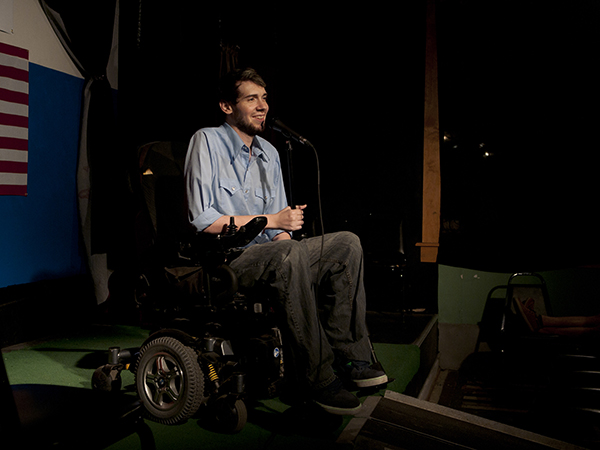Student Films Take on Subjects Light and Heavy at Emerson Film Fest

In My Yizkor, directed by Gabriel Volcovich ’16, an elderly Holocaust survivor looks at his tattooed wrist and is flooded with memories of suffering that, decades later, he finds he cannot overcome.
In Emily Pietro’s ’16 Departure, a little boy is visited outside his window by extraterrestrials, and must decide whether or not to go with them.
Both films—one somber and reflective, the other lighthearted and endearing—will be featured in this year’s Emerson Film Festival, being held Sunday, March 20, 12:00–6:00 pm, in the Bright Family Screening Room at the Paramount Center.
“The idea is to show how diverse the films are that are being made by the students, from first-year undergraduates to MFA students,” said Anna Feder, programming manager of the Bright Lights Film Series, which organized the festival with the Department of Visual and Media Arts.
Seventeen student films will be screened in one of two programs. At 12:00 pm, Anti-Gravity will feature lighter topics and more whimsical projects. Starting at 2:00 pm, Gravity will offer dramatic narrative and serious documentary work. The event will include a range of genres, including sci-fi, animation, narrative, documentary, and comedy.
The festival, now in its 16th year, started out as a small showcase in Los Angeles to engage Emerson alumni, Feder said. For the past three years, it’s been a curated, daylong event held in Boston, with awards and audience-building. Five films are selected to be shown in Los Angeles, and the filmmakers are brought to LA later in the year for the ELA Film Festival.
Pietro made Departure for her Directing Image and Sound class. The assignment was to create a genre film, and Pietro said she wanted to go in a direction she had never tried before: science fiction.
Her goal for Departure was to make a sci-fi film that had tension and drama, but also wasn’t scary or impersonal.
“Just finding a story that was simple enough, yet compelling enough, I think was what gave me the final courage to just go for it, and it all came together really nicely,” Pietro said.
The film’s lead is played by a young cousin of a friend. One of the toughest parts of production was making sure shooting wrapped up before the star’s bedtime, Pietro said.
For My Yizkor, which is a Jewish prayer of remembrance, Volcovich also needed to cast for a child’s role—his protagonist flashes back to his boyhood in Auschwitz. But because Emerson requires that a parent or guardian needs to be on set when a child actor is involved, and Volcovich didn’t want to lose any control or time, he shaved his beard and played the boy himself.
“I look younger than I am,” he said.
Most of the flashbacks were filmed in the Arnold Arboretum, but Volcovich had some footage from Auschwitz that he had shot during a trip he took in high school. Actual images of Auschwitz were blended into the film using green screen.
So much of the film’s production was personal, Volcovich said. When his lead character looks at old photos of family members, he is looking at actual photos of Volcovich’s grandfather and great-grandparents.
“It’s basically my family, so I can relate to him,” Volcovich said.
Hannah Engelson’s documentary short, Jonah Stands Up, blends traditional documentary filmmaking with stop-motion animation to tell the story of artist, comedian, and disability activist Jonah Bascle.
Engelson, who made the film for her MFA thesis, met Bascle years ago in New Orleans through a film Meetup group. She filmed sporadically, and then, with the help of a Kickstarter campaign, moved back to New Orleans for five months to finish shooting. Bascle, who had muscular dystrophy and cardiomyopathy, passed away in December 2014.
Engelson began her career as a photojournalist, and said that many of the skills of that profession translate to documentary filmmaking. But one difference may be in how close the documentarian gets to her subject.
It was difficult to make a film about a man with a life-threatening illness, but it was also a relief, in a way, she said.
“Sometimes it was the worst thing, because, yeah, it’s really hard to have to make a film in that situation,” Engelson said. “And sometimes it was the best possible thing to do at the time, because at least you can do something productive and meaningful.”
For a full list of films and brief descriptions, go to http://websites.emerson.edu/brightlights/event/eff/.
Categories